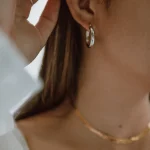Losing a cherished necklace can feel like losing a piece of yourself. Whether it’s a sentimental family heirloom or a favorite accessory, the panic and frustration that come with not knowing where it is can be overwhelming. But don’t worry! Here are some practical tips and comforting thoughts to help you find that lost necklace.
1. Stay Calm and Retrace Your Steps
The first thing to do is to stay calm. Panicking can make it harder to think clearly and remember where you last had your necklace. Take a deep breath and try to remember the last time you saw or wore it. Did you take it off somewhere special? Were you in a hurry? Go back to that moment in your mind and start your search there.
2. Check Common Hiding Spots
Necklaces often end up in the strangest places. Check common areas where you might have taken it off, such as:
- Near the bathroom sink: It’s easy to take off jewelry while washing hands or face.
- On or under your bed: Sometimes, jewelry falls off when you’re sleeping or changing clothes.
- In the laundry: Check pockets and inside the washing machine.
- In your handbag: It might have slipped to the bottom.
3. Organize Your Space
Marie Kondo, a famous organizing consultant, once said, “Tidying is not just about cleaning up; it’s about letting go of what doesn’t spark joy” (KonMari.com). This quote emphasizes the emotional connection to lost items and the importance of organization. Tidying up can often reveal lost treasures. Clean your room or the area where you think you lost the necklace. You might just find it while putting things back in order.
4. Use Environmental Cues
Studies show that our environment can trigger memories of where we last placed an object. According to Bajo and Franklin (1997), environmental cues can help us remember where we put things. Try to recreate the environment where you last had your necklace. This might jog your memory and help you remember where it is.
5. Enlist Help
Sometimes, an extra pair of eyes can make all the difference. Ask family members or friends to help you look. They might spot something you missed.
6. Systematic Search
Elbert Hubbard, a famous writer, once said, “Lost things are found by looking for something else” (MIT.edu). This quote suggests that a systematic search, even if not for the exact item, might lead to the discovery. Start in one area and thoroughly search it before moving to the next. This way, you won’t miss any spots.
7. Stay Positive
Losing something valuable can be disheartening, but it’s important to stay positive. Remember the words of Og Mandino, “Failure is an event, not a person. Yesterday ended last night. Today is a new beginning” (TheStrive.co). Keep searching, and don’t give up hope.
8. Take Advantage of Technology
In today’s digital age, technology can be a big help in finding lost items. While your necklace might not have a tracking device, you can use technology to remember where you last had it. Apps that track your daily activities or photos taken on your phone might give you clues.
9. Create a Dedicated Jewelry Spot
To avoid losing your jewelry in the future, create a specific spot for your necklaces. This could be a jewelry box, a dish on your dresser, or a hook on the wall. By always placing your jewelry in the same spot, you’ll reduce the chances of losing it.
10. Reflect and Learn
Think about how you lost your necklace and what you can do differently to prevent it from happening again. Maybe you need a better routine for taking off your jewelry or a more organized space. Learn from this experience to keep your jewelry safe in the future.
Quotes to Inspire Your Search
Here are some quotes to keep you motivated:
- Sheryl Crow, a musician, said, “If a window of opportunity appears, don’t pull down the shade” (Wikipedia.org). This reminds us to seize every chance to find what’s missing.
- Mignon McLaughlin, an author, stated, “Clutter is the physical manifestation of unmade decisions” (Goodreads.com). Keeping organized can help prevent items from getting lost.
- Nora Roberts, a novelist, shared, “I hope you realize that there is beauty in the imperfection” (NoraRoberts.com). This provides comfort in case the necklace isn’t found, acknowledging its sentimental value.
Understanding Why We Lose Things
Understanding why we lose things can help in our search. According to Ellis and Hunt (1983), losing items often involves cognitive lapses. Stress, distractions, and multitasking can make us more prone to misplacing things. Recognizing these factors can help you be more mindful in the future.
Tips from Studies
Research can offer practical tips. For instance, Friedman (1997) found that our working memory plays a significant role in how we search for lost items. Keeping your mind sharp and reducing stress can improve your search efficiency.
Future Solutions
Innovative technology might also offer future solutions. Hodges et al. (2006) explored the use of RFID tags to track everyday objects. While this might not help you find your necklace today, it’s exciting to think about future advancements that could make losing items a thing of the past.
Final Thoughts
Losing a necklace can be a frustrating experience, but with patience, organization, and a little help from friends and technology, you have a good chance of finding it. Remember to stay calm, retrace your steps, and check common hiding spots. Organize your space, use environmental cues, and stay positive. With these tips, you’ll be better equipped to find your lost sparkle and prevent future mishaps.
Losing something valuable can feel like a setback, but as Og Mandino wisely said, “Today is a new beginning.” Keep searching, stay hopeful, and you might just find that lost necklace shining brightly once more.




